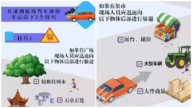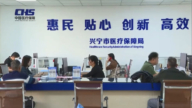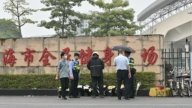【新唐人2013年01月05日訊】中國全國人大常委會通過了實行「網路實名制」草案,外界都預見中共限制網路信息自由的行動會進一步升級。而深入中國的外媒記者指出,雖然國外很多主流媒體被封殺,每天千百萬審查者刪除網上與人權有關的內容,但數不清的推銷毒品、槍支或賣淫的網站卻不被封殺。外媒記者對此深感奇怪。請看報導。
《紐約時報》報導,在中國通過互聯網非常容易就買到定價50美元或100美元的「冰毒、搖頭丸」或者「可卡因」!有的網站宣稱:「提供24小時上門運送服務,貨源長期而穩定。只要打個電話,將在一到五個小時內將貨品送到手中。」服務範圍覆蓋中國數百座城市。
同樣,在網上花幾分鐘時間也能找到銷售槍支的商業網站,能購買到斯普林菲爾德式9毫米手槍,中國軍用54式半自動手槍,步槍等,甚至還有消音器!
文章還寫道,中國網路上還充斥著性和賣淫業,丙種「羥基丁酸鹽」,就是所謂的「約會迷姦藥」,在網上公然販賣,有關的藥效說明令人不寒而慄。
《紐時》指出,所有這些在中國都是非法的,麻醉品走私販通常會被判處死刑。但這似乎並不是政府工作的重點,因為這些網站根本沒有被關閉或者遭到遮罩。
《紐時》還指出,中共遮罩Facebook、YouTube以及《紐約時報》、《彭博通訊社》等網站,對推銷毒品、槍支或賣淫的網站卻不限制,這難道不奇怪嗎?
79年大陸「民主牆」創辦人之一 蔡桂華:「那些危害雖然很大,但不會觸動它的統治根基,但是你如果涉及到他的維穩、涉及它的政治方面,那是要動搖他的根基,那就不一樣。所以它是厚此薄彼,這個是不反應,那個就不行了,那個一放開,馬上就轟然倒塌了。能行嗎!」
民主人士蔡桂華還指出,中共暴政靠的是嚴厲鎮壓與欺騙,也就是一手軟一手硬,來維繫它搖搖慾墜的統治。如果把訊息放開,它的謊言就會像紙一樣容易被捅破,那麼,可能就會導致政權馬上崩潰。
德國《南德意志報》文章「紅色共和國,黑色管道」指出,中國歷來是許多假貨買家的天堂,但現在有些德國名牌的真貨,也以極其低廉的價格在《淘寶》等網站上銷售,但賣家並沒有得到專賣授權,德國原產廠家對此一無所知。中國監管當局對網路言論看管甚嚴,但對於網路上的一些不法商業行為卻無動於衷。
另外,瑞士《新蘇黎世報》網路版文章指稱,中國博客實名制、封殺海外網站、有一支領薪水的宣傳大軍在影響著各種討論話題,並且將那些「走得太遠」的內容刪除,而這些手段,僅僅是為了保護中共在意識形態上的主導權而已。
美國哥倫比亞大學人權研究所訪問學者谷川:「你在網上發一個有關鍵字的東西,有些網站根本就發不出來。所以他這是一種過濾的手段,用關鍵字就把很多敏感信息過濾掉了。還有通過那種,像新浪微博,他就通過人工的審查。」
谷川還表示,中國的網站不能觸碰中共的底線,如果觸碰了,輕則將網站關閉,重則將網站創辦人抓起來判刑。2007年《愛琴海》網站總編張建紅,筆名力虹,被中共以「煽動顛覆國家政權罪」判處六年徒刑,2010年,力虹在獄中被迫害致死。
《紐約時報》指出,互聯網的控制讓許多中國年輕人感到厭惡,他們對於多黨民主也許並沒有甚麼想法,就是想看看YouTube上的視頻。
《紐約時報》對新一屆政治局提出建議,說:能不能去管管那些銷售槍支和毒品的網站,而放過那些交流觀點和信息的網路空間呢?
採訪/易如 編輯/宋風 後製/周天
Exchanging Views Is Censored in China but
not Firearms and Drugs
Chinese National People’s Congress Standing Committee
passed the draft of the implementation of the “Internet real-name system”.
The world foresees the Chinese Communist Party (CCP) adding
to its action in order to restrict online freedom of information.
Foreign media reporters said that most foreign media
are blocked.
Every day millions of censors delete online contents
regarding human rights.
However, countless sites of drugs, guns or prostitution
are not being blocked.
Foreign media correspondents find this very strange.
Let’s look at the reports.
The New York Times reported you can buy methamphetamine,
ecstasy or cocaine for $50 or $100 via the Internet in China.
Some sites claim to provide 24-hour home delivery service,
with long-term and stable supply.
Just making a phone call, one can receive the drugs
within one to five hours. Services cover hundreds of cities in China.
Similarly, one can find commercial websites selling guns;
the Springfield-type 9 mm pistol, Chinese military 54-style
semi-automatic pistols, rifles, and even silencers!
The report also said that the Chinese Internet is filled with
pornography, prostitution and even the “date rape drug."
Their open trafficking online chills one’s bones.
The report also pointed out that all those activities are illegal
in China, narcotics smugglers usually get death sentence.
But authorities do not focus on that,
so these sites have not been shut down or disguised.
The CCP masked the websites of Face book,
YouTube and the “New York Times", and “Bloomberg".
The websites selling drugs, guns or prostitution
are not closed down. Isn’t this strange to you?
Cai Guihua, a founder of the “Democracy Wall" in 1979:
“Those activities are dangerous.
They do not touch the foundation of the ruling party however.
If you do something to affect the CCP stability and
involve its political aspects, it will be a different matter.
Therefore, it is not a matter of favoritism. If the CCP does not
react, it will soon collapse. So, it has to do something.”
Cai Guihua also pointed out that the CCP has relied
on harsh repression and deception to maintain its power.
It is using one soft hand and one iron hand policy to
maintain its shaky reign.
If it allows freedom of information, its lies will be easily
pierced, like paper. The regime may collapse immediately.
German “Süddeutsche Zeitung" published an article
called “Red Republic, Black Piping".
The article said that China has always been
a haven for many fake goods buyers,
but some German genuine named brands are also sold
at extremely low prices on the “Tobacco" site.
However, they have not obtained authorization from the
manufacturers, who know nothing of these illicit activities.
Chinese regulatory authorities keep very strict rules about
network information, but nothing for unscrupulous businesses.
The web edition of the Swiss “New Zurich” also wrote
an article alleging the CCP uses real name system to block overseas sites.
There is a salaried propaganda army impacting
a variety of discussion topics.
They delete the contents of those" being too far off” to
protect the dominance of the CCP’s ideology.
Gu Chuan, a visiting scholar from Columbia University
Institute for Human Rights: “If you use a keyword that is monitored, you cannot send the message.
That is filtering, using key words
to filter out sensitive information.
Another way is through a manual review,
like they do to microbloggings on Sina website.”
Gu Chuan believes that the Chinese websites
cannot go near the CCP’s boundary.
If you touch it, your website may be shut down or
you may be arrested and sent to jail.
In 2007, the founder “Aegean" website, Zhang Jianhong,
pen name Lihong was sentenced to six years jail for “inciting subversion of state power."
In 2010, Lihong was tortured to death in prison.
The New York Times pointed out that young people in China
feel disgust regarding controlling of the Internet.
They do not think too much of democracy.
All they want is watch some videos on You Tube.
Regarding the new Politburo recommendations,
the New York Times said:
“How about taking a look at those websites selling
guns and drug and leave some room for exchanging views and information on the network?”



























